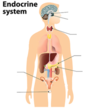Hormones Flashcards
Where is the hormone ADH made?
The pituitary gland
Where is the hormone adrenaline made?
The adrenal glands (on top of the kidneys)
Where is the hormone insulin made?
Pancreas (by beta cells)
Where is the hormone testosterone made?
The Testis
Where is the hormone progesterone made?
Ovaries
Where is the hormone oestrogen made?
Ovaries
Where is the hormone FSH made?
The pituitary gland
Where is the hormone LH made?
The pituitary gland
What does ADH stand for?
Antidiuretic Hormone
What does LH stand for?
Luteinising Hormone
What does FSH stand for?
Follicle Stimulating Hormone
Which is the target organ for the hormone ADH?
The kidneys
Which is the target organ for the hormone adrenaline?
Heart; Lungs; muscles
Which is the target organ for the hormone insulin?
Liver
Which is the target organ for the hormone testosterone?
Male reproductive organs
Which is the target organ for the hormone progesterone?
The uterus and mammary glands
Which is the target organ for the hormone oestrogen?
Female reproductive system
Which is the target organ for the hormone FSH?
Ovaries
Which is the target organ for the hormone LH?
Ovaries
Where is the function (job) of the hormone adrenaline?
* Increases the heart rate. * Increases breathing rate. * Boosts the delivery of oxygen and glucose to the brain and muscles, preparing the body for ‘flight or fight’.
Where is the function (job) of the hormone ADH?
Water retention by the kidneys
Where is the function (job) of the hormone insulin?
Causes glucose to move from the blood into the cells. In liver and muscle cells excess glucose is converted to glycogen for storage.
Where is the function (job) of the hormone testosterone?
* Main male reproductive hormone * Stimulates sperm production * Causes secondary sexual characteristics
Where is the function (job) of the hormone progesterone?
Maintains the lining of the uterus during the middle part of the menstrual cycle and during pregnancy.
Where is the function (job) of the hormone oestrogen?
* Stops production of FSH (so only 1 egg matures at a time) * Repairs, thickens and maintains the uterus lining * Stimulates the pituitary gland to release LH * Causes secondary sexual characteristics
Where is the function (job) of the hormone FSH?
Causes an egg to mature in an ovary.Stimulates the ovaries to release oestrogen
Where is the function (job) of the hormone LH?
Triggers ovulation (the release of a mature egg) from an ovary
Where is the pituitary gland found?
In the brain
HIGHER - What happens when there are high ADH levels in the blood?
* More water is resorbed by the (nephrones / kidney tubules in the) kidneys back in to the blood.
* This is an example of negative feedback.
What happens when there is too little water in the blood?
The hypothalamus detects this and causes the pituitary gland to release more ADH into the blood.
Where is the hypothalamus found?
In the brain
HIGHER - What happens when there are low ADH levels in the blood?
* Less water is resorbed by the (nephrons in the) kidneys back in to the blood.
* This is an example of negative feedback.
What happens when there is too little water in the blood?
The hypothalamus detects this and causes the pituitary gland to release more ADH into the blood.
Which hormones are found in the oral contraceptive (the pill)?
Oestrogen or progesterone
Which hormones are found in fertility drugs?
FSH and LH
What is a hormone?
A chemical messenger carried in the blood to target organs
Where are hormones made?
Glands
What is the function (job) of the pituitary gland?
It is a ‘master gland’ which secretes several hormones into the blood in response to body conditions.
Which gland is which?

Diagram with answers:

Exam Question (May 2012):
One of the characteristics of living organisms is the ability to respond to a change in their surroundings.
In mammals, such as humans, responses are controlled by nervous or hormonal communication.
(a) ADH is an example of a hormone.
(i) Where is ADH produced? (1 mark)
(ii) Describe the effects of ADH in the body (3 marks)
(b) Describe two ways in which nervous communication differs from hormonal communication (2 marks)
Answers:
a) i) hypothalamus / pituitary
ii) 1. Collecting duct;
2. More permeable
3. More water reabsorbed into blood / blood more dilute
4. Osmosis;
5. Urine concentrated / less water in urine / less urine
b)
Nervous = i) faster; ii) electrical impulses; iii) in neurones; iv) shorter lasting; v) target cells
Hormonal = i) Slower ii) chemical; iii) in the blood; iv) longer lasting; v) all around body


